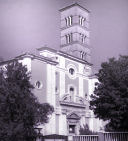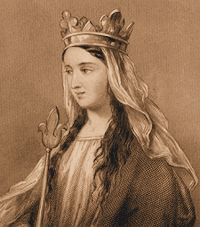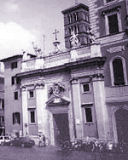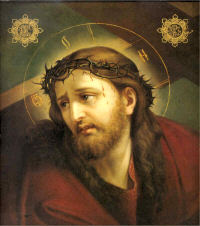Lent: March 14th
Wednesday of the Third Week of Lent
Other Commemorations: St. Matilda (RM)
» Enjoy our Liturgical Seasons series of e-books!
"Do not imagine that I have come to abolish the Law or the Prophets. I have come not to abolish but to fulfill. Amen, I say to you, until heaven and earth pass away, not the smallest letter or the smallest part of a letter will pass from the law, until all things have taken place. Therefore, whoever breaks one of the least of these commandments and teaches others to do so will be called least in the Kingdom of heaven. But whoever obeys and teaches these commandments will be called greatest in the Kingdom of heaven (Mt 5:17-19)."

The Station, at Rome, is in the church of St. Sisto Vecchio. It was built in the 4th century, and was one of the first parish churches in Rome and was known as the Titulus Crescentianae. Tradition claims that it was founded by Pope Anastasius I.
Meditation - Baptismal Graces and Obligations
Like the neophytes of the early Church, we now seek to stir up in our hearts the grace which we received at our baptism. We are the children of God and the heirs of the kingdom of heaven. If we prove true to the vows we made at our baptism, we shall hear that blessed invitation on the day of judgment: "Come ye blessed of My Father, possess you the kingdom prepared for you from the foundation of the world." How eternally thankful to God we shall then be for having incorporated us into Himself and His Church through baptism!
By baptism we were incorporated in Christ as a member of His body, or as a branch of the vine. Christ lives in His members as a vine lives in its branches. What is done to the members of Christ, then, is done also to Him. "This is My commandment, that you love one another as I have loved you" (John 15:12). We shall all be judged by the degree of charity we practiced with regard to our neighbor.
"As long as you did it to one of these My least brethren, you did it to Me" (Gospel). It is a spiritual work of mercy to pray for sinners and to undertake sacrifices for them that they may find the grace to return to God. Since they are still members of the same body, although diseased, we feel a responsibility for their conversion. We become even more conscious of this responsibility during Lent. The Lord has assured us, "I desire not the death of the wicked, but that the wicked turn from his way and live" (Ezech. 33:11).
Excerpted from The Light of the World, Benedict Baur, O.S.B.
Things to Do:
- Today's Gospel provides the basis for the corporal works of mercy: feed the hungry; give drink to the thirsty; clothe the naked; harbor the harborless; visit the sick; ransom the captive; bury the dead. Discuss this Gospel with your children — this is an important truth that will guide them in charity all their life. Give practical examples: if he obeys his parents, shares a toy with his brother or sister, or gives alms to the poor, then he is doing all these loving things to Jesus Himself.
St. Matilda (also known as "Maud" or "Maude")
 This princess was daughter of Theodoric, a powerful Saxon count. Her parents placed her very young in the monastery of Erford, of which her grandmother Maud was then abbess. Our Saint remained in that house, an accomplished model of all virtues, till her parents married her to Henry, son of Otho, Duke of Saxony, in 913, who was afterwards chosen king of Germany. He was a pious and victorious prince, and very tender of his subjects.
This princess was daughter of Theodoric, a powerful Saxon count. Her parents placed her very young in the monastery of Erford, of which her grandmother Maud was then abbess. Our Saint remained in that house, an accomplished model of all virtues, till her parents married her to Henry, son of Otho, Duke of Saxony, in 913, who was afterwards chosen king of Germany. He was a pious and victorious prince, and very tender of his subjects.
Whilst by his arms he checked the insolence of the Hungarians and Danes, and enlarged his dominions by adding to them Bavaria, Maud gained domestic victories over her spiritual enemies more worthy of a Christian and far greater in the eyes of Heaven. She nourished the precious seeds of devotion and humility in her heart by assiduous prayer and meditation. It was her delight to visit, comfort, and exhort the sick and the afflicted; to serve and instruct the poor, and to afford her charitable succor to prisoners. Her husband, edified by her example, concurred with her in every pious undertaking which she projected.
After twenty-three years' marriage God was pleased to call the king to himself, in 936. Maud, during his sickness, went to the church to pour forth her soul in prayer for him at the foot of the altar. As soon as she understood, by the tears and cries of the people, that he had expired, she called for a priest that was fasting to offer the holy sacrifice for his soul.
She had three sons: Otho, afterwards emperor; Henry, Duke of Bavaria; and St. Brunn, Archbishop of Cologne. Otho was crowned king of Germany in 937, and emperor at Rome in 962, after his victories over the Bohemians and Lombards.
The two oldest sons conspired to strip Maud of her dowry, on the unjust pretence that she had squandered the revenues of the state on the poor. The unnatural princes at length repented of their injustice, and restored to her all that had been taken from her.
She then became more liberal in her alms than ever, and founded many churches, with five monasteries.
In her last sickness she made her confession to her grandson William, the Archbishop of Mentz, who yet died twelve days before her, on his road home. She again made a public confession before the priests and monks of the place, received a second time the last sacraments, and, lying on a sack-cloth, with ashes on her head, died on the 14th of March in 968.
—Excerpted from Lives of the Saints, by Alban Butler, Benziger Bros. ed. [1894]
Patronage: death of children; disappointing children; falsely accused people; large families; people ridiculed for their piety; queens; second marriages; widows
Symbols and Representation: alms; bag of money; crown; orb; scepter; purse, indicative of her generosity; queen with a whip; queen holding a church
Highlights and Things to Do:
- Read more about St. Matilda:
- Read Spotlight on Queen Mathilda of Saxony.
- St. Mathilda's remains are in Quedlinburg Abbey next to her husband. The church is now used by the Lutheran Evangelical Church in Germany

Thursday of the Fourth Week of Lent
Station with Santi Silvestro e Martino (St. Sylvester in the Head and St. Martin in the Hills):
Popularly called "San Martino ai Monti," this was probably one of the tituli or parish churches during ancient Rome under by St. Sylvester I and dedicated to St. Martin of Tours.
For more on Santi Silvestro e Martino, see:
For further information on the Station Churches, see The Stational Church.







